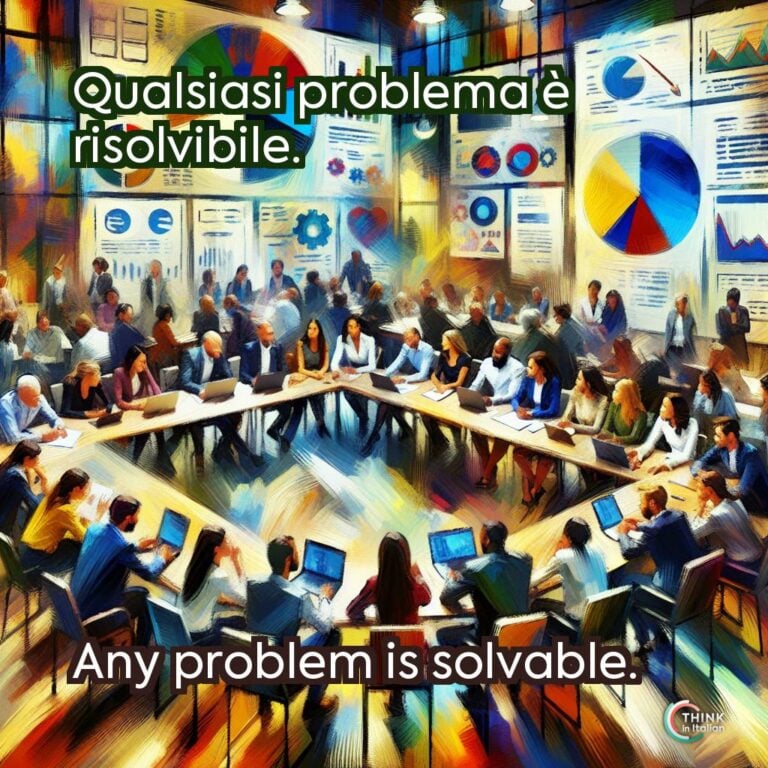“Any” in Italian
How do you say “Any” in Italian?
Even in English, it can sometimes be tricky to understand the use of the word “any”. In Italian, this word can be translated in several ways depending on the context:
- Qualsiasi/Qualunque: Both can be used interchangeably and mean “any” to refer to things or choices among many, specifically when the choice is unrestricted. Example:
Puoi scegliere qualsiasi libro.
You can choose any book.
In qualunque momento.
At any moment.
- Chiunque: It means “anyone” and is used to refer to any person, in contexts where the identity of the person is unknown or irrelevant. Example:
Chiunque può partecipare.
Anyone can participate.
- Ovunque/Dovunque: Both mean “anywhere” to express an unspecified or unknown location. Example:
Puoi andare ovunque.
You can go anywhere.
- Qualche: Used to indicate a small, indefinite amount or number of something, typically translated as “any” in negative and interrogative English sentences. In Italian it is always singular and affirmative, as in:
Qualche giorno fa.
A few days ago.
As you can see, unlike English, in Italian we have specific combinations of “any” to form new words to refer to undefined items. However, I am confident you spotted a pattern in Italian as well. Let me show it to you.
Etimology of Indefiniteness in Italian
The Italian suffix -unque is used to create indefinite pronouns and adverbs, adding a meaning of universality or indeterminacy to the words it’s attached to. Another very common instance of this constructions is “comunque” (anyway, however).
If we look at the history of the Italian language, we manage to trace back this suffix to Latin, where it served a similar role in forming indefinite pronouns and adverbs.
This suffix is derived from Latin -cumque, which is added to interrogative or relative pronouns to give a sense of indefiniteness. Here’s how this works in some specific cases:
- Qualunque: A combination of the Latin words qualis (what kind) and -cumque, forming qualiscumque, which meant “of whatever kind it may be”. Over time, this condensed into “qualunque” in Italian.
- Chiunque: Derived from the Latin quis (who) combined with -cumque, forming quicumque, which translates to “whoever” or “anyone at all”.
- Dovunque: Originating from ubi (where) in Latin, combined with -cumque to form ubicumque, meaning “wherever”.
- Comunque: From quomodo (how) in Latin, with -cumque added to form quomodocumque, meaning “however” or “in whatever way”.
“Anything” in Italian
As I mentioned before, the words qualunque and qualsiasi mean the same thing and can therefore be used interchangeably. They have one form only and generalize the noun they refer to.
Per me va bene qualunque film.
Any film is fine for me.
Qualsiasi proposta verrà considerata.
Any proposal will be considered.
Although they usually precede it, qualunque and qualsiasi can follow a noun, taking on a very generalized meaning, indicating mediocrity and ordinariness.
Un uomo qualunque/ un uomo qualsiasi
An ordinary man
The placement of these words in sentences is relevant also for their number. In fact, they can be used with a plural noun only if they follow the noun.
Porta dei vestiti qualsiasi.
Bring any kind of clothes.
Ho comprato delle birre qualunque.
I bought some ordinary beers.
Unlike English, Italian does not have a specific form to say anything, but we add the word cosa (thing) after qualunque and qualsiasi.
Farei qualunque cosa per te.
I would do anything for you.
“Anyone” in Italian
As simple as it is, to say anyone or whoever, we use chiunque. It never varies and is only used in its singular form.
Lo potrebbe fare chiunque.
Anyone could do it.
Chiunque sia stato, verrà espulso.
Whoever did it will be expelled.
“Anywhere” in Italian
To say anywhere or wherever, we use ovunque or dovunque. These two expressions have the same meaning and can be used interchangeably.
Andrei dovunque pur di non stare qui.
I would go anywhere just not to be here.
Ovunque tu sia, ricordati delle tue radici.
Wherever you are, remember your roots.
Other Ways to Translate “Any” in Italian
Depending on the type of statement we want to express, there might be more ways to say “any” in Italian.
- Ogni: It means “every”, but can sometimes translate to “any” when implying every instance of something within a category. Example:
Ogni opinione è importante.
Any opinion is important.
- Nessun/Nessuno: It is used in negative constructions to mean “no” or “any” in sentences like:
Non ho nessun soldo.
I don’t have any money.
- Alcuno/Alcuna/Alcuni/Alcune: These work very similarly to “nessuno”, meaning “any” in negative sentences. It is typically used as negative counterpart of “qualche”. For instance:
Non ho alcuna ragione di crederlo.
I have no reason to believe that.
Anything new?
If you are a native English speaker, I can imagine this sounded all very confusing: so many words to express a relatively easy concept that English conveys with a word only! And you’re right!
Each of these translations captures different aspects and uses of the English word “any” reflecting the richness and flexibility of the Italian language.
Its linguistic evolution demonstrates how Italian, like other Romance languages, evolved directly from Latin, adapting forms to fit its evolving phonetic and grammatical systems.
Each of the indefinite terms we discussed in this article is useful for constructing sentences where the subject or object is undefined, providing flexibility in various contexts.
Now you are ready to convey different meanings and nuances thanks to the flexibility that the Italian language provides. Get ready, and start speaking Italian!




